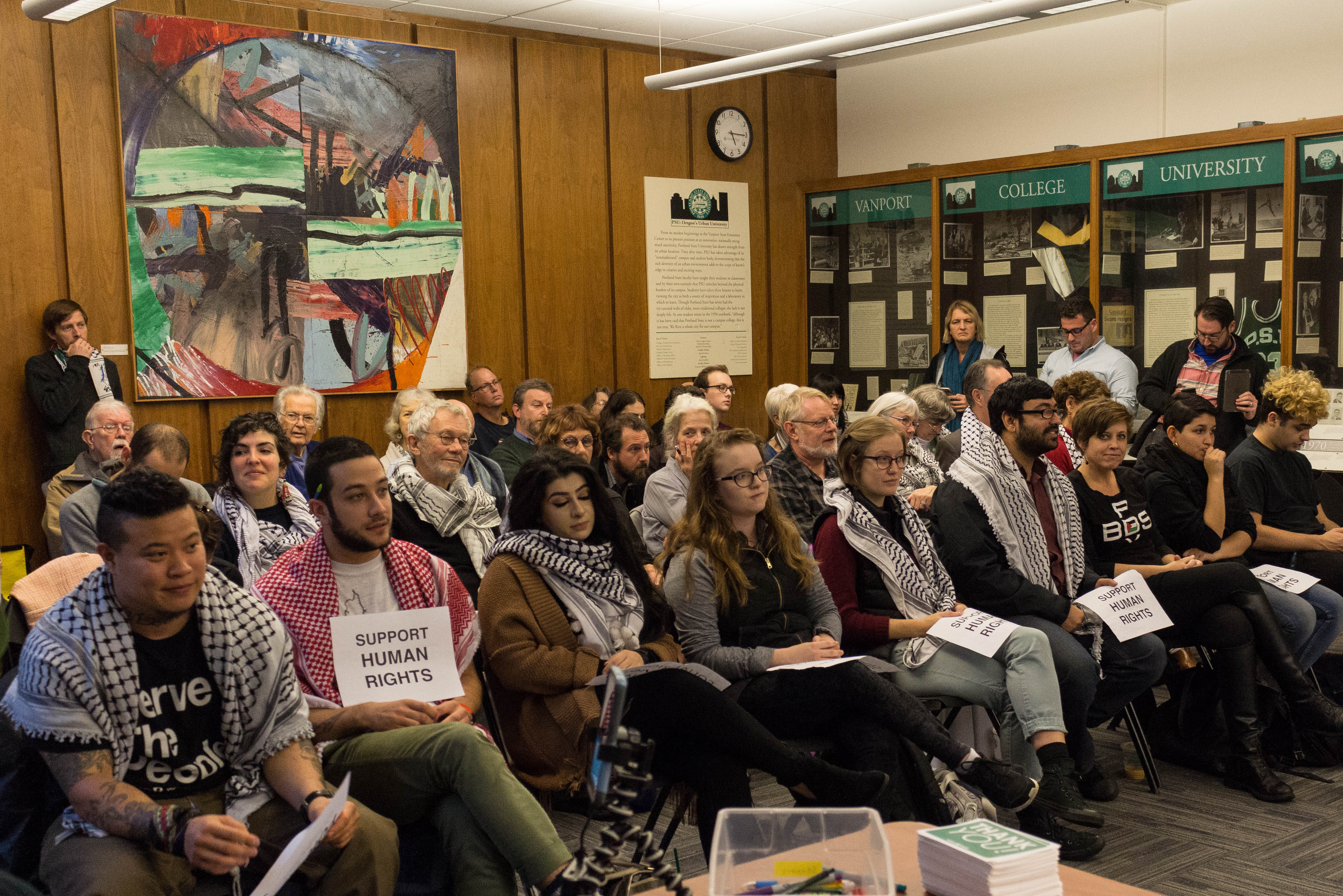On Oct. 24, Associated Students of Portland State University Senate held its second discussion and final vote on the resolution to recommend divestment from companies involved in Israeli military occupation.
Prior to the reading and subsequent vote, Devon Backstrom of the Oregon Student Association gave the state of the Get Out The Vote address. During the Sept. 26 ASPSU meeting OSA announced its campaign to register students to vote. The campaign ran through Oct. 18, the last day to register to vote in Oregon.
“Congratulations everyone, you registered just under 4,000 students to vote,” Backstrom said. “Oregon Student Association is kind of like the statewide student government. These 4,000 students you registered for this term help build our political capital. Oregon was probably the most reinvested state over the 2015–2016 cycle, which means we got a huge reinvestment. But, we gotta keep it up because there’s a $1.5 billion shortfall next biennium which is going to impact our student reinvestment by 15–20 percent. We need to make sure we de-prioritize that.”
The “Resolution to Recommend Divestment from Companies Involved in Israeli Military Occupation” calls on PSU to divest from companies found to profit from human rights violations against Palestinian civilians by the Israeli government. Companies specified in the resolution are Caterpillar Inc., Motorola Solutions, Hewlett Packard Enterprises, HP Inc, and G4S. The resolution also requests an alternative internal investment screen to prohibit future investments in companies which profit from human rights violations in either Israel or Palestine.
The room was packed and several people signed up to speak for or against the resolution. Prior to anyone speaking, ASPSU representatives set a two-minute time limit and an alternation between pros and cons. At the flip of a coin a person from the pro side spoke first. A total of 19 speakers were heard: 16 pro, 3 con.
On the pro side, talking points included: The 522 checkpoints along the West Bank which hinder the movements of Palestinians but not Israelis; a lack of Israeli civil law privileges for Palestinians; apartheid (racial segregation) in Israel; reasons why divestment is not anti-Semitic; the importance of separating the view of Jewish people and the governing state of Israel itself; and the extensive research that went into drafting the resolution.
Other discussions involved two pro speakers who gave eyewitness accounts of bulldozers destroying homes. Other speakers’ personal stories of their Palestinian families being forced from homes, speaking passionately of the tears and pain seen in the eyes of their parents and grandparents.
On the con side, reasons for opposition addressed by speakers included: Concerns about anti-Semitism in the resolution and its potential negative effect on the Israeli community as a whole; testimony that the resolution is bigoted, one-sided and historically inaccurate; and the biblical and historical documents serving as evidence that Jewish people have had a long history in the region.
One speaker openly asked why the creation of a Jewish state was not just. Another person proposed support of joint Israeli-Palestinian projects, then stated that passing the resolution would send a clear message of hate and intolerance.
Following the public discussion, ASPSU legislative affairs director Phoenix Singer stated that the resolution is ethical and just, that struggles are interrelated and that not passing the resolution would mean “none of us are free.”
Chair Brent Finkbeiner called for the vote and the resolution to divest passed 22 to 2 with one abstention.







Democracy? If it were not so patently ridiculous it would be funny.
Hamas a democracy? Then so is the KKK.
Meanwhile, Mahmoud Abbas is serving his eleventh year of a four year term.
And what of the highly vaunted Arab Spring? What did they result in? Well…we all know. And the other dozen of Islamic nations? Tell me about one where religious freedom is honored.
Democracy and Islam? Get real.